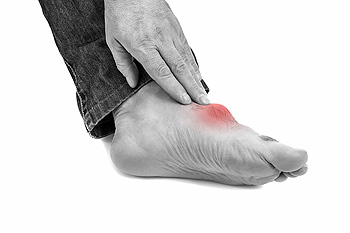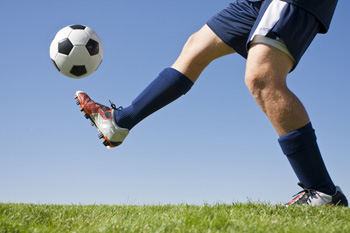
 The medical condition that is referred to as gout is a painful ailment that affects the feet. More specifically, the joints in the big toe are typically distressed if this form of arthritis develops. It can cause severe pain and discomfort and may lead to joint deformities if it is not treated early. It occurs as a result of excess uric acid that exists in the blood levels. This may produce crystals that lodge in the joints of the big toe. This condition is typically caused by eating foods that are high in purine levels. These often include red meat, shellfish, and alcohol. There are methods that can be implemented, which may prevent gout attacks from occurring. These can consist of losing weight, performing a daily exercise routine, and eating healthy foods. If you are having pain in the big toe and surrounding areas and would like additional information about how gout affects the feet, please consult with a podiatrist.
The medical condition that is referred to as gout is a painful ailment that affects the feet. More specifically, the joints in the big toe are typically distressed if this form of arthritis develops. It can cause severe pain and discomfort and may lead to joint deformities if it is not treated early. It occurs as a result of excess uric acid that exists in the blood levels. This may produce crystals that lodge in the joints of the big toe. This condition is typically caused by eating foods that are high in purine levels. These often include red meat, shellfish, and alcohol. There are methods that can be implemented, which may prevent gout attacks from occurring. These can consist of losing weight, performing a daily exercise routine, and eating healthy foods. If you are having pain in the big toe and surrounding areas and would like additional information about how gout affects the feet, please consult with a podiatrist.
Gout is a painful condition that can be treated. If you are seeking treatment, contact Dr. Stephan J. LaPointe from Georgia Foot & Ankle Specialists . Our doctor will treat your foot and ankle needs.
What Is Gout?
Gout is a form of arthritis that is characterized by sudden, severe attacks of pain, redness, and tenderness in the joints. The condition usually affects the joint at the base of the big toe. A gout attack can occur at any random time, such as the middle of the night while you are asleep.
Symptoms
Risk Factors
Prior to visiting your podiatrist to receive treatment for gout, there are a few things you should do beforehand. If you have gout you should write down your symptoms--including when they started and how often you experience them, important medical information you may have, and any questions you may have. Writing down these three things will help your podiatrist in assessing your specific situation so that he or she may provide the best route of treatment for you.
If you have any questions, please feel free to contact our office located in Rome, GA . We offer the newest diagnostic and treatment technologies for all your foot care needs.
 Athletes are known to have many foot and ankle complications. Some issues tend to affect the athletes of specific sports more than others. For example, “turf toe” is common among those who participate in football, soccer, basketball, wrestling, gymnastics, and dance. Turf toe is the spraining of the big toe joint. Another usual injury among athletes is a stress fracture. Those who run and jump on hard surfaces, such as runners, basketball players, and dancers, commonly experience fractures. Additionally, Achilles tendonitis, which is the inflammation of the back of your ankle, is seen among basketball and tennis players. Finally, a pinched nerve condition known as tarsal tunnel syndrome is seen among various types of athletes. Considering the extra stress athletes put on their bodies, it is no surprise that they are prone to foot and ankle injuries. These people in particular should look out for complications so they can continue performing in their respective sport effectively. If you believe you may have a foot or ankle injury due to a sport, you should contact a podiatrist.
Athletes are known to have many foot and ankle complications. Some issues tend to affect the athletes of specific sports more than others. For example, “turf toe” is common among those who participate in football, soccer, basketball, wrestling, gymnastics, and dance. Turf toe is the spraining of the big toe joint. Another usual injury among athletes is a stress fracture. Those who run and jump on hard surfaces, such as runners, basketball players, and dancers, commonly experience fractures. Additionally, Achilles tendonitis, which is the inflammation of the back of your ankle, is seen among basketball and tennis players. Finally, a pinched nerve condition known as tarsal tunnel syndrome is seen among various types of athletes. Considering the extra stress athletes put on their bodies, it is no surprise that they are prone to foot and ankle injuries. These people in particular should look out for complications so they can continue performing in their respective sport effectively. If you believe you may have a foot or ankle injury due to a sport, you should contact a podiatrist.
Sports related foot and ankle injuries require proper treatment before players can go back to their regular routines. For more information, contact Dr. Stephan J. LaPointe of Georgia Foot & Ankle Specialists . Our doctor can provide the care you need to keep you pain-free and on your feet.
Sports Related Foot and Ankle Injuries
Foot and ankle injuries are a common occurrence when it comes to athletes of any sport. While many athletes dismiss the initial aches and pains, the truth is that ignoring potential foot and ankle injuries can lead to serious problems. As athletes continue to place pressure and strain the area further, a mild injury can turn into something as serious as a rupture and may lead to a permanent disability. There are many factors that contribute to sports related foot and ankle injuries, which include failure to warm up properly, not providing support or wearing bad footwear. Common injuries and conditions athletes face, including:
Sports related injuries are commonly treated using the RICE method. This includes rest, applying ice to the injured area, compression and elevating the ankle. More serious sprains and injuries may require surgery, which could include arthroscopic and reconstructive surgery. Rehabilitation and therapy may also be required in order to get any recovering athlete to become fully functional again. Any unusual aches and pains an athlete sustains must be evaluated by a licensed, reputable medical professional.
If you have any questions please feel free to contact our office located in Rome, GA . We offer the newest diagnostic and treatment technologies for all your foot and ankle needs.
The medical condition that is known as plantar hyperhidrosis refers to feet that sweat excessively and frequently. Fungal skin infections including athlete’s foot can develop as a result of this condition, and a foul odor may exist. It is important to wear shoes and socks that are made of breathable materials, as this may help to control a portion of the sweating. Additionally, patients who are affected with this condition find it beneficial to wash and dry the feet daily, followed by using foot powder. Mild relief may be found when the socks are changed numerous times throughout the day.
If you feel you have this ailment, it is advised that you seek the counsel of a podiatrist who can properly diagnosis and treat plantar hyperhidrosis.
If you are suffering from hyperhidrosis contact Dr. Stephan J. LaPointe of Georgia Foot & Ankle Specialists . Our doctor can provide the care you need to attend to all of your foot and ankle needs.
Hyperhidrosis of the Feet
Hyperhidrosis is a rare disorder that can cause people to have excessive sweating of their feet. This can usually occur all on its own without rigorous activity involved. People who suffer from hyperhidrosis may also experience sweaty palms.
Although it is said that sweating is a healthy process meant to cool down the body temperature and to maintain a proper internal temperature, hyperhidrosis may prove to be a huge hindrance on a person’s everyday life.
Plantar hyperhidrosis is considered to be the main form of hyperhidrosis. Secondary hyperhidrosis can refer to sweating that occurs in areas other than the feet or hands and armpits. Often this may be a sign of it being related to another medical condition such as menopause, hyperthyroidism and even Parkinson’s disease.
In order to alleviate this condition, it is important to see your doctor so that they may prescribe the necessary medications so that you can begin to live a normal life again. If this is left untreated, it is said that it will persist throughout an individual’s life.
A last resort approach would be surgery, but it is best to speak with your doctor to find out what may be the best treatment for you.
If you have any questions please feel free to contact our office located in Rome, GA . We offer the newest diagnostic and treatment technologies for all your foot and ankle needs.
 If you are scheduled for any type of foot surgery, it is wise to prepare for an appropriate recovery period. Many patients find it beneficial to ask friends and family for a helping hand, in addition to having adequate amounts of food available prior to the surgery. It will help to have essential items as near to you as possible, as this may help in preventing unnecessary walking on the affected foot. Immediately following surgery, you will most likely experience swelling, and this may last for several days. The majority of the swelling will gradually diminish as the healing process occurs. If you would like additional information about how to prepare for an upcoming foot surgery, please consult with a podiatrist.
If you are scheduled for any type of foot surgery, it is wise to prepare for an appropriate recovery period. Many patients find it beneficial to ask friends and family for a helping hand, in addition to having adequate amounts of food available prior to the surgery. It will help to have essential items as near to you as possible, as this may help in preventing unnecessary walking on the affected foot. Immediately following surgery, you will most likely experience swelling, and this may last for several days. The majority of the swelling will gradually diminish as the healing process occurs. If you would like additional information about how to prepare for an upcoming foot surgery, please consult with a podiatrist.
Foot surgery is sometimes necessary to treat a foot ailment. To learn more, contact Dr. Stephan J. LaPointe of Georgia Foot & Ankle Specialists . Our doctor will assist you with all of your foot and ankle needs.
When Is Surgery Necessary?
Foot and ankle surgery is generally reserved for cases in which less invasive, conservative procedures have failed to alleviate the problem. Some of the cases in which surgery may be necessary include:
What Types of Surgery Are There?
The type of surgery you receive will depend on the nature of the problem you have. Some of the possible surgeries include:
Benefits of Surgery
Although surgery is usually a last resort, it can provide more complete pain relief compared to non-surgical methods and may allow you to finally resume full activity.
Surgical techniques have also become increasingly sophisticated. Techniques like endoscopic surgery allow for smaller incisions and faster recovery times.
If you have any questions please feel free to contact our office located in Rome, GA . We offer the newest diagnostic and treatment technologies for all your foot and ankle needs.